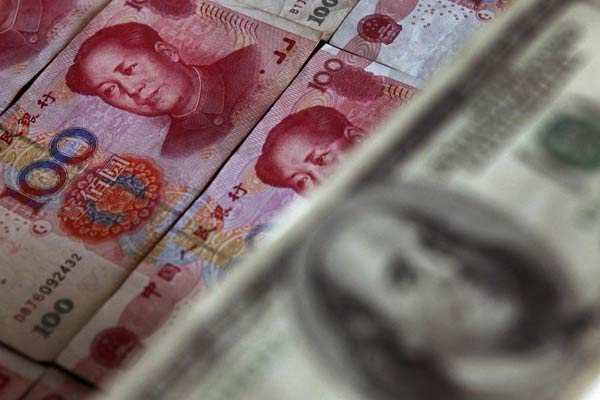China's yuan to stay stable despite speculating forces: PBOC
(Xinhua) Updated: 2016-01-07 16:41
 |
|
A photo illustration shows a $100 banknote placed above Chinese 100 yuan banknotes in Beijing in this May 10, 2013 file photo. [Photo/Agencies] |
The reassurance, made by the People's Bank of China (PBOC), came as the currency's central parity rate lost 332 basis points to 6.5646 against the US dollar on Thursday, the lowest level since March 18, 2011, data from the China Foreign Exchange Trading System showed.
The renminbi's exchange rate is supposed to go along with market forces, which should be the demand and supply of foreign exchanges based on the real economy, instead of speculating forces using excessive leverage, the editorial said.
"Some forces attempt to make profit from speculating on the renminbi. This kind of trading is unrelated to the demand of the real economy and does not reflect the real market demand and supply, which only leads to abnormal fluctuations in the yuan's exchange rates and sends the wrong signals to the market," it said.
"Faced with the speculating forces, the central bank has the capabilities to keep the yuan basically stable at an reasonable equilibrium level," it added.
The renminbi will go with changes of demand and supply in the market, and its exchange rates will change in both directions, it said.
In addition to the central bank's determination to keep the yuan stable, the conditions are there for the currency to stay basically stable, said the article, citing the steady overall economy.
"Even as China's export growth declined in 2015, the share of the country's export in the global total has still increased. There is no necessity for China to stimulate export and stabilize growth through competitive currency depreciation," it said.
The central bank foresees "some uncertainty" concerning the exchange rates of the US dollar in the following period, and the impact of the US Fed's interest rate hike has largely digested by the market.
The central bank pointed to the fundamentals of China's economy as a long-term factor that will prop up the renminbi.
There is no foundation for the yuan's continuous depreciation and it remains a strong currency among international reserve currencies, it added.
- Guizhou tea export doubles in 2015
- China's Tianfu cola to make comeback after 20 year hiatus
- China's yuan to stay stable despite speculating forces: PBOC
- High-tech innovations debut as CES 2016 kicks off
- Huawei to provide first copper-based broadband service in Latin America
- New rules to limit big shareholders' stock selling
- Ride-hailing app Didi Kuaidi expands into online car sales
- China's growth to ease further to 6.7% in 2016: World Bank

















